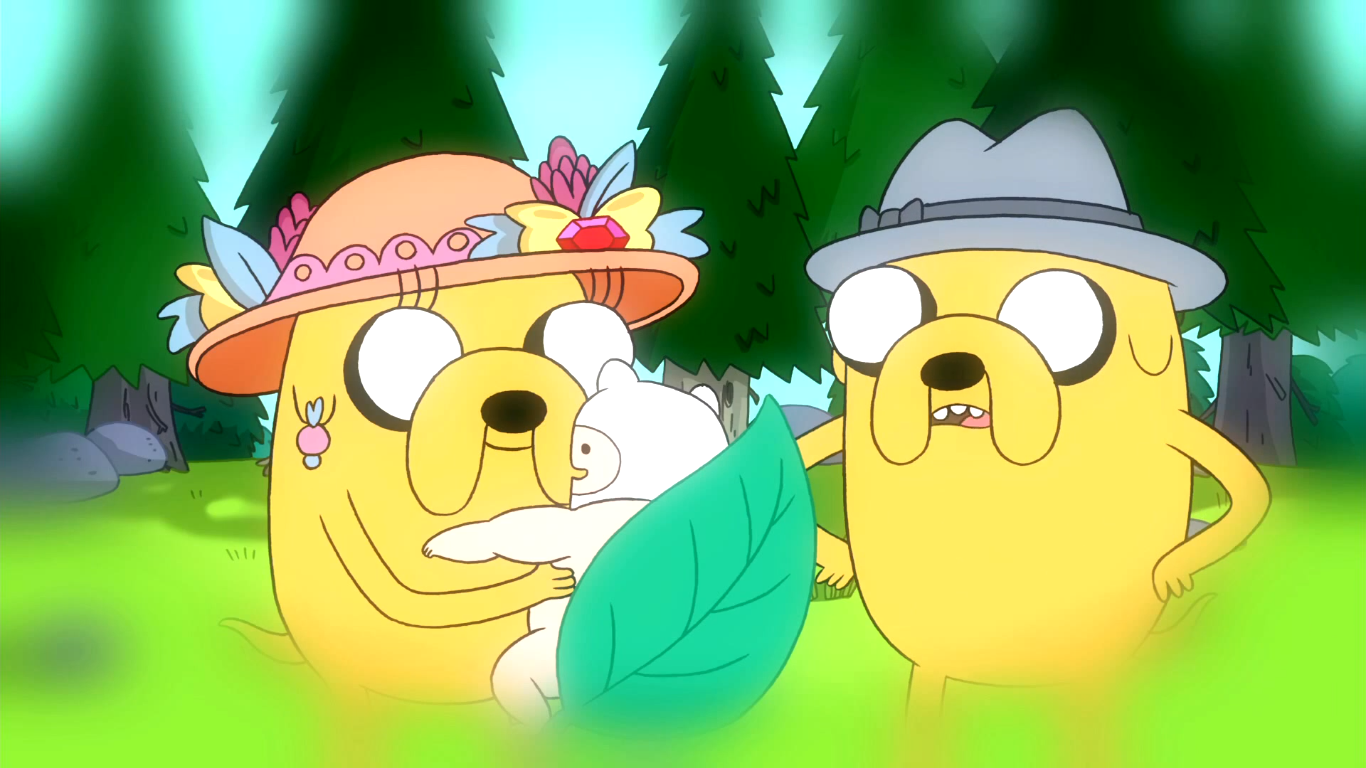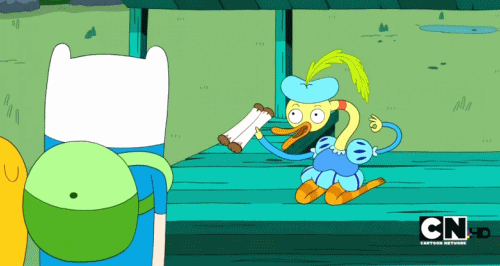 Adventure Time is a (young) D&D player's dream: an adolescent inhabits a world of magic, technology, and candy which is at once both sinister and sincere. Adventure Time offers a few things which I think are, if not unique, certainly special. Let's first examine what Adventure Time has in common with D&D (or other RPGs). There are other television shows and books that could entice us, but Adventure Time:
Adventure Time is a (young) D&D player's dream: an adolescent inhabits a world of magic, technology, and candy which is at once both sinister and sincere. Adventure Time offers a few things which I think are, if not unique, certainly special. Let's first examine what Adventure Time has in common with D&D (or other RPGs). There are other television shows and books that could entice us, but Adventure Time: - Centers around the exploits of a small band of adventurers.
- Is story-driven, while remaining character-focused.
- Reveals a world in which magic plays a substantial part, but which is still shockingly similar to the world in which we live.
- Has rules and laws which govern its physics, which are playfully loose compared to the "real world."
Let's look a bit closer at how the show appeals to us.
Adventurers don't need to be randomly thrown together; the most interesting characters have a connection right from the start.
2. Is story-driven, while remaining character-focused.
This may sound like a "duh" statement in today's character-driven landscape, but it still bears a brief comparison to some of the best 20th century literature from which the fantasy genre grows. Consider The Hobbit as the prime adventure story of the last hundred years: a character is driven from the familiar to the unfamiliar, meets a cast of unlikely but heroic characters, encounters magic, and eventually triumphs over both himself and his surroundings, returning home a changed individual.
Now think about it again: outside of Bilbo, and (on his deathbed) Thorin Oakenshield, do any of the characters truly develop through the story? I don't mean to start a Tolkien deathmatch, but of the fifteen members of Thorin and Company, only one & a half are really characters in the way we'd address them today. The fun in The Hobbit comes from seeing this gaggle of dwarves get into trouble & having Bilbo or Gandalf figure out or luck out & save them.
Adventure Time offers something different. Not only are Finn and Jake incredibly human creatures who learn, love, and change, but the majority of the creatures and beings they encounter regularly are similarly "real." The random creature/character on the road side can be (alternately) incredibly important or nondescript and unnamed.

Perhaps most clearly, Finn's hidden past drives the story--but how he and others react to that past is what keeps him real, and keeps us invested in the story itself.
The cast of a story needs to react to the story, and the story needs to react to the cast of characters. Don't let one overpower the other.
3. Reveals a world in which magic plays a substantial part, but which is still shockingly similar to the world in which we live.
 Jake is a magic, talking, stretching dog. Right from the get go, magic is taken as normal. At the same time, Finn is shockingly ordinary. At the start of the episode "Web Weirdos," Finn and Jake do some "stunts." Jake does some amazing parkour, and Finn is capable of being excited about a level of "climb and jump" which is (intentionally) laughable by comparison. This kind of contrast is necessary for the kind of wonder and awe that D&D worlds should evoke in our players (if not always our characters)!
Jake is a magic, talking, stretching dog. Right from the get go, magic is taken as normal. At the same time, Finn is shockingly ordinary. At the start of the episode "Web Weirdos," Finn and Jake do some "stunts." Jake does some amazing parkour, and Finn is capable of being excited about a level of "climb and jump" which is (intentionally) laughable by comparison. This kind of contrast is necessary for the kind of wonder and awe that D&D worlds should evoke in our players (if not always our characters)!For every fantastic dreamscape, floating castle, or kingdom of living ice, include a haggling merchant, a hungry pauper, or an angry mother-in-law. The magic must exist with the mundane or it simply becomes the new mundane.
4. Has rules and laws which govern its physics, which are playfully loose compared to the "real world."
Finn and Jake are constantly getting beaten into bloodied pulps, transformed into other creatures, shrunk, enlarged, stranded without supplies, or outright zombified. Yet, by the end of the episode, all is right with the world again (even if Finn does lose an arm in the process). Pain is a reality, but not a crippling one.
Speaking of supplies, where in the world do Finn and Jake do their grocery shopping? Outside of the occasional pie from TT and meat from "Meat Man," they don't seem to have a home garden for veggies or a local supermarket to pick up their foodstuffs (though occasionally one or the other of them will "go out" to get supplies). Do we ever question this?
Unless it's really important where the foodstuffs come from, we're much more interested in the songs Jake sings about bacon pancakes than about where he got the bacon or batter in the first place.
 As one of my players recently said, we play D&D to get away from managing our day-to-day affairs. It doesn't matter where the bacon pancakes come from, or how the fighter keeps swinging even though he's been at 1hp for twenty minutes.
As one of my players recently said, we play D&D to get away from managing our day-to-day affairs. It doesn't matter where the bacon pancakes come from, or how the fighter keeps swinging even though he's been at 1hp for twenty minutes.That's all for Part 1! Stay tuned for Part 2 where I'll look at some other important lessons from Adventure Time.



No comments:
Post a Comment